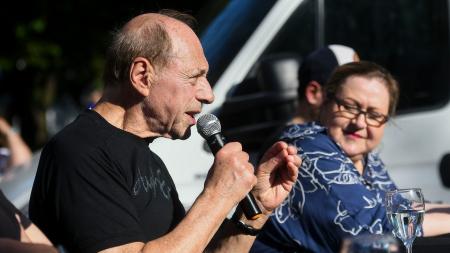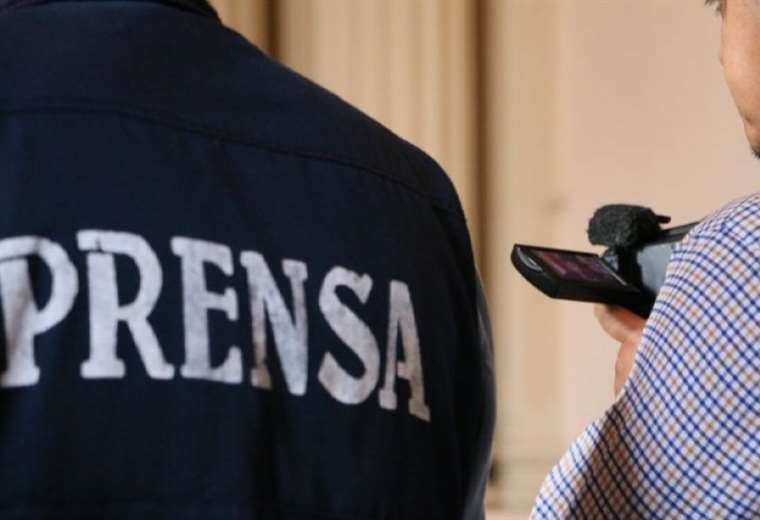Political, justice and trade union leaders and officials discussed “lawfare” and hate speech at the VI Meeting of the Federal Human Rights Network at the former Esma site in the city of Buenos Aires, where the national deputy of the Front of All (FdT) and president of the Buenos Aires Justicialist Party, Máximo Kirchner, said that it is not “understood where so much hatred has come from, nor why this violent right” and “stigmatizes everything that feels that it does not obey him”.
with the motto “They yesterday for us, today we for her”, referring to the contribution of former President Néstor Kirchner and Vice President Cristina Fernández de Kirchner to human rights policies and the Memory, Truth and Justice process, former Vice President Amado Boudou spoke on a panel; the former judge of the Court, Eugenio Raúl Zaffaroni; the lawyer and director of Legal Affairs of the Senate Graciana Peñafort; the Secretary of Justice Juan Martín Mena, and the national deputy and general secretary of the CTA, Hugo Yasky.
While at the closing of the meeting, which was also attended by, among others, the mayor of Quilmes, Mayra Mendoza and the head of Suteba, Rodolfo Baradel, Kirchner spoke; the Secretary of Human Rights, Horacio Pietragalla Corti; Taty Almeida, from Mothers of Plaza de Mayo – Founding Line; and the president of Relatives of the Disappeared and Detained for Political Reasons, Lita Boitano.
The word of Hugo Yasky
The deputy from the Frente de Todos said that “he does not understand where so much hatred has come from, or why this violent right wing, stigmatizing everything that it feels does not obey it” and stated that “it is always willing to run the margins of democratic agreements.

“These violent groups fostered from the discursive are not the ones who suffered political ban, for example,” he said, noting that, “on the contrary, it is worth asking why, by electing those they want to elect, they end up being so violent and using that type of method to want to impose their ideas or suppress those who do not think like them”.
In this line, he considered that “It could be that they feel oppressed by not being able to hear their voice in the media or not finding their ideas in the big media that generates a strong internal anger”but maintained that “on the contrary, the discourse of these violent groups is often the same.”

“They can do and say what they want, we defend that Argentines can organize themselves and that they see themselves reflected in the big media,” he said and affirmed that “they turn on the TV and listen to themselves” and then asked: “Where do the conditions come from that generate a scene of violence and exhaustion like nobody listens to them and that everyone has abandoned them, if they are in power?”
Taty Almeida and her message of hope
For her part, Taty Almeida remarked that “in you lies the hope of the mothers and grandmothers who are left”, she affirmed that “we must have memory, one of the legs of our struggle. Memory, truth and justice. Legal justice, never justice by their own hands” and asked to be “clear not just who the adversary is, but who the enemy is and to continue supporting, of course, a national and popular government”.

The president of Relatives of the Disappeared and Detained for Political Reasons, in turn, stressed that: “I am a Peronist to the bone and I cannot be more proud” and stated that she was wearing a mask because “I have cancer and luckily I can be treated today They gave me the news of how everything went super well, I can give myself the third dose, that’s why I have a mask.”
Horacio Pietragalla Corti and his tireless fight for human rights
The Secretary of Human Rights, meanwhile, stressed that “today their slogan summons us yesterday for us, and we are talking about Néstor and Cristina,” he pointed out in this sense that “they want to attack the only person who guarantees us to continue repairing what it still couldn’t” and remarked that “it is our responsibility that neoliberalism never returns to the country again”.

At the beginning of the meeting, organized by the Federal Network for Human Rights, Mena explained in the panel that “We have been in government for almost three years and the legal war for the purpose of political persecution is in fairly good health and we were not prepared for the surprise factor” and pointed out that “we were used to coups and we were surprised throughout the region that this time the way to install the political model they want did not come that way.”
Along these lines, he maintained that “the attack on Cristina is the direct result of this persecution and hate speech” and said that “when you see Luciani’s absolutely unfounded allegation of a movie asking for 12 years in prison when groups were being financed in parallel violent people throwing torches, hanging body bags, what did they expect to happen?
“Violating the fundamental essence of the oral and public trial, they held an accusation for 4 years, in the trial they had to show the evidence and only reaffirmed the story,” he warned and said that “meanwhile the violent ones who had been financing and firing triggered him twice to Cristina. We have to bear in mind the relationship it has with the legal war”.

Thus, he maintained that “it is the human rights movement that has to give us energy to recover a power of the State and the administration of justice that watches over all Argentines” and assured that “this dispute has to take place in the sphere of politics”.
A reflection of Eugenio Zaffaroni
Zaffaroni, meanwhile, stated that “in the midst of hate speech, judges emerge who have the executioner’s ax under their robes,” and stated that “these signs of the judicial Condor Plan, the so-called lawfare, is actually an illicit association between judges, public ministries, the media and some politicians”.
“It is necessary to present projects for the restructuring of the Judicial Power, of the Supreme Court”Eugenio Zaffaroni
“We must present restructuring projects for the Judiciary, for the Supreme Court,” he said, stressing that “the national movement belongs to Argentina, it will continue and we will continue with Cristina” and said that “with depression there is no resistance and with depression you don’t fight, always forward “.
For his part, the former vice president explained in the panel that lawfare “has to do with the fact that we live in a stage subject to the capitalist dictatorship” and affirmed that “there is an entire institutional framework that focuses on protecting capital over human life.” .
Hugo Yasky and his vision of Argentine justice
Yasky, meanwhile, said that “in our country there has always been a justice apparatus aligned with the interests of the ruling class” and stated that “during State terrorism there was a lot of cynicism, they talked about laws when all rights were violated aberrant”.

Along these lines, he remarked that “we are in this fight, it is not part of the past, because the trial of Cristina Fernández de Kirchner is nothing more than an attempt to ban her, to dismantle the popular movement.”
Graciana Peñafort and her vision of “lawfare”
For his part, Peñafort assured that “a good part of the ‘lawfare’ is in good health and that means that the rule of law is in danger” and pointed out that “I am not talking about politicians alone, but about all of us because we are all going to have a labor lawsuit, an issue of possession or alimony that is resolved in the judiciary”.

















